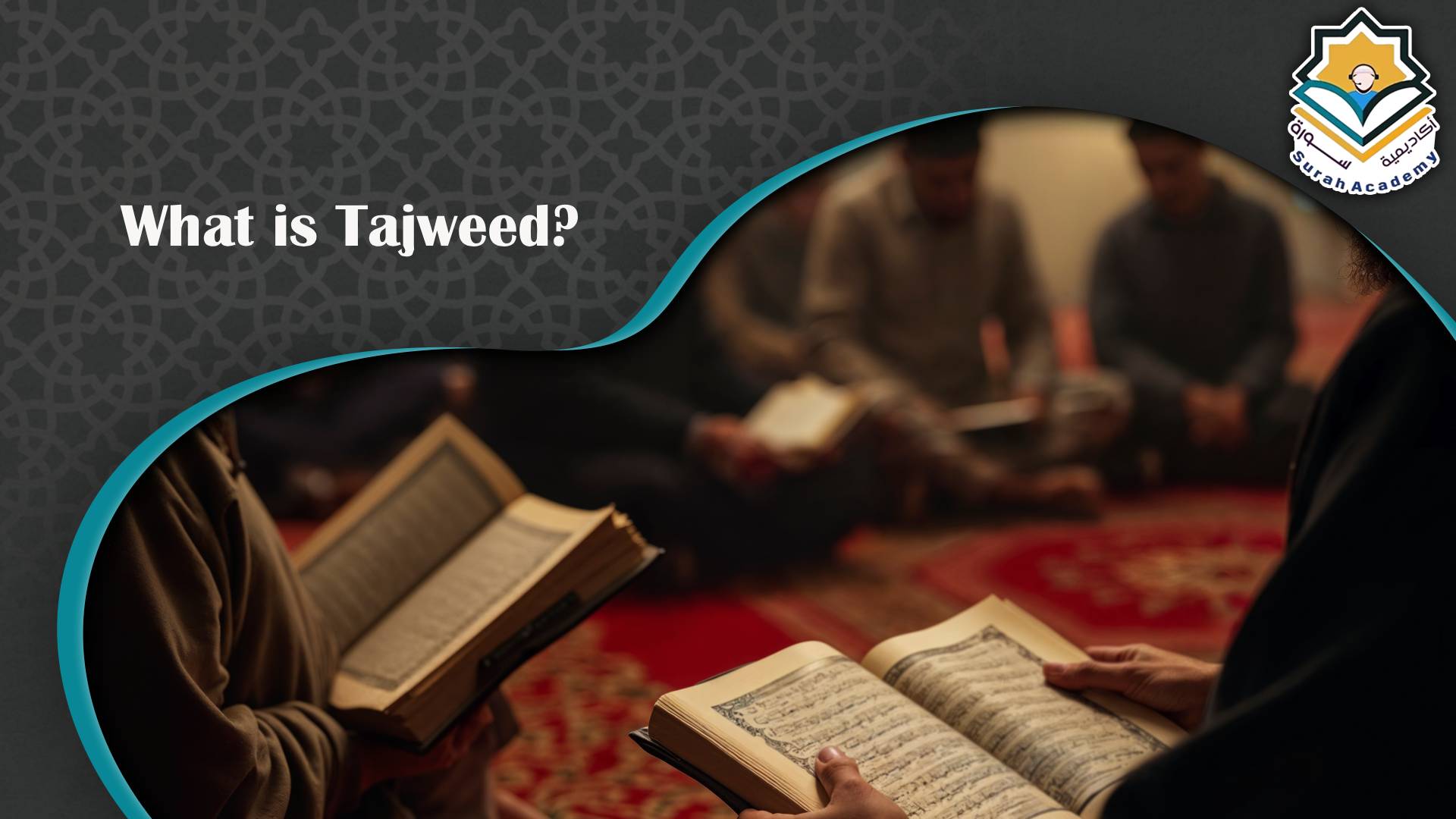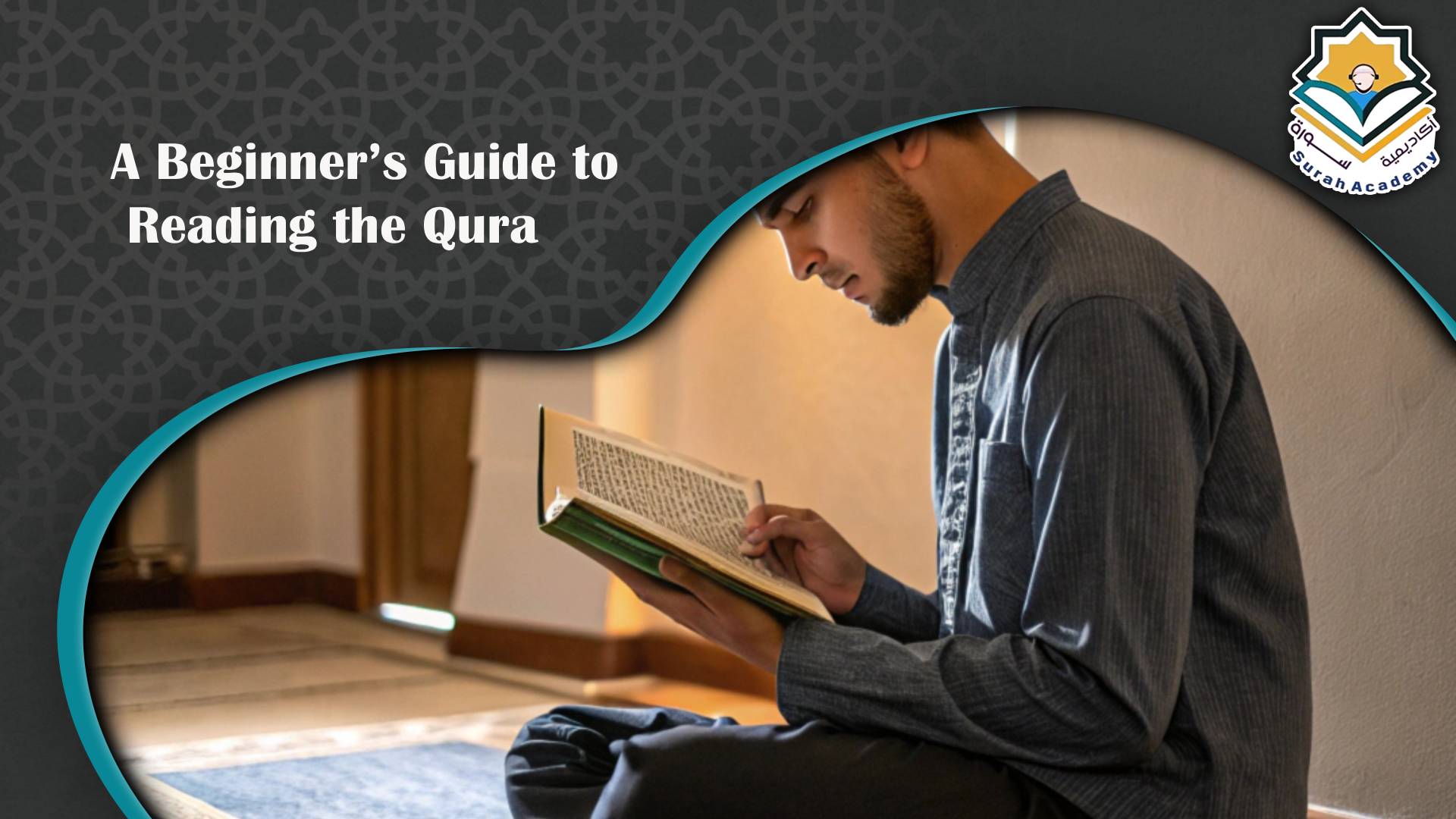Unlock the true essence of the Holy Quran through the art of learn quran with tajweed , where every word is recited with precision, beauty, and reverence. At Surah Academy, students embark on a spiritual and educational journey that connects them to the divine message as it was originally revealed.
With expert guidance, they master the proper pronunciation and articulation of each letter, preserving the authenticity of the Quranic text. Tajweed not only enhances clarity and fluency but also instills confidence and deep spiritual presence in every recitation.
What is Tajweed?

Tajweed can be briefly defined as the proper elocution and pronunciation of the Quranic text. More precisely, it is the science and art of reciting the Quran in accordance with the specific phonetic rules that govern the articulation of each letter and sound. These rules ensure that every letter is pronounced from its correct point of origin (makhraj) and with its rightful characteristics (sifaat), preserving the meaning and beauty of the divine message. Tajweed is essential not only for accuracy but also for honoring the sacredness of the Quran as it was revealed to the Prophet Muhammad (peace be upon him).
Begin Your Quran Journey Today with Surah Academy
Are you ready to transform your Quran recitation and connect more deeply with the words of Allah? At Surah Academy, we offer expert-led Tajweed courses designed for learners of all levels—whether you’re just starting out or seeking to perfect your recitation. Join a supportive learning environment where every student receives personalized guidance, structured lessons, and spiritual enrichment. Don’t wait—take the first step toward mastering the Quran as it was meant to be recited. Enroll now and start your journey with Surah Academy!

Benefits of learn quran with tajweed
when learn quran with tajweed that is more than just mastering pronunciation—it’s a pathway to deeper spiritual connection and greater reward. By applying the rules of Tajweed, learners preserve the original beauty and meaning of the Quranic revelation.
Companionship of Noble Angels
Aisha (RA) reported that the Prophet (SAWS) said: “The one who recites the Quran fluently and precisely will be with the noble and obedient angels. As for the one who recites it with difficulty—stammering and struggling through its verses—he will receive a double reward.”
Best Among You
Uthman ibn Affan (RA) narrated that the Prophet (SAWS) said: “The best among you are those who learn the Quran and teach it to others.”
Ten Rewards for Each Letter
The Prophet (SAWS) said: “Whoever recites a letter from the Book of Allah will receive a reward, and each reward will be multiplied by ten. I do not say that ‘Alif-Laam-Meem’ is one letter; rather, ‘Alif’ is a letter, ‘Laam’ is a letter, and ‘Meem’ is a letter.”
[Reported by Tirmidhi]
A Path to Paradise
The Prophet (SAWS) said: “On the Day of Judgment, the one who regularly recited the Quran will be told: ‘Recite and rise, and recite slowly and clearly as you did in the world, for your position in Paradise will be at the last verse you recite.’”
Spiritual Tranquility and Peace
Al-Bara’ ibn Azib (RA) narrated that a man was reciting Surah Al-Kahf while his horse was tied with two ropes nearby. A cloud descended and hovered over him, causing the horse to jump. The next morning, the man mentioned the incident to the Prophet (SAWS), who said: “That was tranquility (Sakeenah) which descended as a result of the Quran being recited.”
How to Begin to learn quran with tajweed
Starting your journey with learn quran with tajweed requires the right guidance and resources. First and foremost, seek a qualified teacher—learn quran with tajweed is best through direct listening, practice, and correction, as accurate pronunciation must be heard and applied in real-time. At Surah Academy, experienced instructors provide personalized feedback to help students master each rule correctly.
In addition, it’s important to study from a reliable book that outlines the rules of Tajweed clearly and gradually. Taking it step by step ensures long-term retention and understanding. Lastly, make a habit of listening to skilled Quran reciters. Pay close attention to how they apply Tajweed, and don’t hesitate to replay the verses multiple times until you grasp the details of their recitation. This combination of learning, listening, and practicing is key to developing proper Quranic recitation with Tajweed.
Read also: learning quran with tajweed
Tajweed Rules
learn quran with tajweed must primarily be through listening and consistent practice, as perfect recitation is developed by hearing how each letter and rule is applied. While written explanations can be helpful, they should serve only as supportive guidance. It is highly recommended to learn quran with tajweed under the supervision of a qualified teacher. This article will provide a broad overview of some essential Tajweed rules to support your learning journey.
Key Terms to Know
Ghunnah (Nasal Sound):
This refers to a nasalized sound produced when pronouncing certain letters. To feel it, try pinching your nose closed and saying a word that starts with “m” or “n.” You’ll notice a vibration or buzzing in your nose—like when someone says “Mmmm” while enjoying delicious food!
Sakinah / Sakin:
This term refers to a letter that carries a sukoon ( ْ ) and is pronounced without a vowel.
Example: Noon Sakinah (نْ) means the letter noon with sukoon.
Noon Sakinah and Tanween
This rule applies to situations where a noon sakinah (نْ) or tanween (double vowels such as ـً / ـٍ / ـٌ ) is followed by specific letters. These rules determine whether to pronounce the noon sound clearly, merge it, or apply a nasal sound.
1. Idhaar (Clear Pronunciation):
If the noon sakinah or tanween is followed by any of the six letters:
[ ء – ه – ع – ح – غ – خ ],
then the noon sound is pronounced clearly and fully, without ghunnah (nasalization).
Example:
مَنْ آمَنَ
سَمِيعٌ عَلِيمٌ
2. Idghaam (Merging):
Idghaam occurs when the noon sakinah or tanween is merged with the following letter. There are two types:
With Ghunnah (Nasal Merging):
If the next letter is one of these: [ ي – ن – م – و ], the noon sound is not pronounced separately. Instead, it merges into the following letter with a nasal sound (ghunnah).
Example:
مَنْ يَقُولُ
سَمِيعٌ مَصِيرٌ
Eight Tips To Improve Quran Recitation
Al-Barā’ ibn ‘Āzib (RA) reported that he heard the Messenger of Allah (SAWS) say:
“Beautify the Qur’an with your voices, for a beautiful voice enhances the beauty of the Qur’an.”
(Narrated by Dārimī, Mishkat al-Masabih 2208, Book 8, Hadith 98)
The Qur’an is far more than a sacred text—it is a direct connection to Allah, a source of guidance, mercy, and spiritual clarity. Each verse we recite brings us closer to our Creator and unveils layers of wisdom and divine meaning. Whether you’re just beginning or have been reciting the Qur’an since childhood, refining your recitation is a powerful way to deepen your relationship with the Book of Allah.
Below are practical tips to help you recite the Qur’an beautifully, with purpose, and in a way that enhances your spiritual experience.
learn quran with tajweed and Perfect Your Pronunciation
Tajweed is the foundation of accurate Quran recitation. It comprises rules that govern how each letter should be pronounced, preserving the clarity and eloquence of the Qur’an. Learning Tajweed helps you recite in a smoother, more melodious manner.
Start by learning the rules from a qualified Qari or an authentic online platform. Begin with short surahs and simple verses, then gradually move to longer passages as your confidence grows. Like any other art, mastering Tajweed requires dedication and regular practice.
Develop Intonation (Tarteel)
Tarteel refers to the rhythm and melody in Quranic recitation. It’s not just about making the recitation sound beautiful—it also brings emotional depth to the verses, enhancing their spiritual impact.
To improve your intonation, listen to experienced Qaris and observe how they control their pitch and tone. Understand the meanings of the verses you’re reciting to deliver them with feeling and awareness.
Repetition and Consistency
Consistency is key. Repeating verses regularly will help train your tongue and vocal cords to adapt to the natural flow of the Qur’an. Even if it feels challenging at first, keep reciting with Tajweed and Tarteel in mind. Over time, your fluency and confidence will improve significantly.
Explore Different Recitation Styles
The Qur’an can be recited in multiple accepted styles, each with unique characteristics. Start with the recitation style common in your region, then explore others as your skills improve. Online resources, books, and guidance from expert Qaris can help you diversify your recitation style.
Learn from a Qualified Teacher
To truly excel in reciting the Qur’an, learning from a skilled teacher, Ustad, or Qari is invaluable. They offer personal feedback, correct pronunciation, and ensure you apply the rules of Tajweed accurately. Teachers also help deepen your understanding of Qur’anic meanings and sciences.
If you’re looking for structured guidance, consider enrolling in a platform like Surah Academy, where expert instructors provide professional and personalized Tajweed training.
Record and Review Your Recitation
Recording your own recitation is a highly effective self-assessment tool. By listening to yourself, you can identify pronunciation issues, Tajweed errors, or pacing problems, and work on improving them. This reflective practice builds awareness and helps track progress.
Listen to Expert Qaris
Listening to skilled reciters regularly helps sharpen your ear for correct pronunciation, rhythm, and emotional delivery. Their beautiful recitation not only enhances your own but also uplifts your heart, fostering a deeper love for the Qur’an.
Be Patient and Stay Committed
Perhaps the most important tip of all: remain patient and persistent. Learning to recite the Qur’an beautifully takes time, effort, and dedication. Mistakes are natural, but with consistency and sincere effort, improvement is inevitable.
Embrace the journey, honor the process, and trust that every step you take is drawing you closer to Allah and His words.
Types of Quran recitation
The different styles of Quranic recitation are referred to as Qirā’āt. Each Qira’ah represents a unique method of pronunciation, articulation, and rhythm, passed down through authentic chains of narration. These variations are not contradictions but reflect the richness and flexibility of the Quranic revelation. There are seven widely recognized Qirā’āt, each associated with a prominent reciter and region.
Qirā’ah of Asim al-Kufi (Kufa)
This style is among the most popular today, particularly through the narration of Hafs. It was frequently used by Imam Abu Hanifa (RA) and Imam Ahmad ibn Hanbal (RA).
Qirā’ah of Naafi’ al-Madani (Madinah)
Practiced by Imam Malik (RA) and also narrated by Imam Ahmad ibn Hanbal (RA), this style is known for its melodic flow and clarity.
Qirā’ah of Ibn Kathir al-Makki (Makkah)
Adopted by Imam Shafi’i (RA), this style was preserved by well-known narrators such as Qunbul and Al-Buzzi.
Qirā’ah of Abu Amr al-Basri (Basra)
This recitation style was preserved by Ad-Doori and As-Soosi, known for its unique linguistic features.
Qirā’ah of Ibn Aamir ash-Shami (Syria)
Preserved through the reciters Ibn Dhakwan and Hisham, this Syrian Qira’ah is marked by distinct pronunciation patterns.
Qirā’ah of Hamzah al-Kufi (Kufa)
Known for its complexity and depth, this style was transmitted by the narrators Khallad and Khalaf.
Qirā’ah of Al-Kisaa’i (Kufa)
Another Kufan style, preserved by Al-Layth and Ad-Doori, it is notable for its rhythmic cadence and linguistic precision.
Learn Tajweed Rules for a Beautiful Quran Recitation
Tajweed is not merely a set of technical rules—it is a refined art that safeguards the pronunciation, rhythm, and clarity of the Quran, preserving its sacredness and intended meanings.
By understanding and applying Tajweed you gain the ability to recite with precision, avoiding frequent errors such as letter fusion or mispronunciation. This careful attention to articulation not only improves the correctness of your recitation but also enhances its spiritual and aesthetic quality.
To begin your Tajweed journey, you can benefit from a variety of resources such as books, mobile apps, and recordings of expert reciters. However, for comprehensive learning, enrolling in a structured Tajweed course is highly recommended. These advanced programs provide detailed instruction, guided practice, and personalized feedback to ensure that you can apply the rules confidently and effectively in your recitation.
What are the benefits of reading the Quran?
brings immense spiritual rewards—even for those who may not fully understand its meanings.
The Prophet Muhammad ﷺ said:
“Whoever recites a single letter from the Book of Allah will receive one good deed for it, and that good deed will be multiplied tenfold. I do not say that ‘Alif-Lam-Meem’ is one letter, but rather Alif is a letter, Lam is a letter, and Meem is a letter.”
— [Sunan At-Tirmidhi]
Even for those still struggling to recite fluently, the reward is doubled. In another hadith, the Prophet ﷺ stated:
“The one who is proficient in reciting the Quran will be with the noble and righteous scribes (the angels), and the one who recites it with difficulty, stammering or stumbling through its verses, will receive a double reward.”
— [Sahih Muslim]
There are many other authentic narrations that highlight the virtue of reciting the Quran—especially for those who make it a consistent daily practice.
A Beginner’s Guide to Reading the Quran

Learning to recite the Quran correctly is a spiritual journey that begins with the right foundation. Whether you’re a beginner or returning to improve your skills, the steps below will guide you through a structured and effective path.
Find the Right Teacher to Guide You
The Quran was revealed orally before it was ever written. The Prophet Muhammad (peace be upon him) received it through the angel Jibril (Gabriel), and his companions memorized it through direct listening and repetition. Allah says in the Quran:
In a hadith, the Prophet (peace be upon him) used to review the Quran with Jibril every night during Ramadan:
“Jibril would meet him every night during Ramadan to review the Quran together.”
(Sahih al-Bukhari)
Inspired by this tradition, Muslims have long gathered for group recitation during Ramadan, a practice known as Tadarus Al-Quran.
While online videos and audio recordings are helpful, the most effective way to learn Quranic recitation is through direct transmission (talaqqi) from a qualified teacher, as practiced by the Prophet and his companions.
Thankfully, today we have access to many certified teachers (e.g., ARS-certified in Singapore) who can guide learners, even in challenging times. At a minimum, every Muslim should strive to correctly recite Surah Al-Fatihah, as it is a fundamental part of prayer.
Don’t Focus Solely on Completing the Quran
Beginners should prioritize learning to recite correctly, not just finishing the Quran from cover to cover. The Quran is not arranged chronologically like a typical book. Rather, it is divinely organized with scattered wisdom and guidance throughout.
It’s better for beginners to start with the shorter chapters (Al-Mufassal), especially those revealed in Makkah, which are simpler in both length and content. These surahs cover essential beliefs and lay the foundation for deeper understanding.
To begin learn quran with tajweed (rules of recitation), there are several helpful methods, such as:
1-Qa’idah Baghdadiyyah
2-Iqra
3-Tilawati
4-Ar-Ruh Al-Amin
These structured methods make it easier for learners to master the Arabic letters and pronunciation. However, having a teacher remains essential to point out errors, correct articulation, and provide guidance.
Self-Determination and Consistency
Learning to recite requires patience and effort. Whenever challenges arise, students should take the initiative to seek clarification from their teacher and stay committed to the learning process.
Self-Revision Using Audio and Video Resources
Frequent listening and repetition of accurate Quran recitations help reinforce proper pronunciation. Practicing regularly outside of class is crucial to improving.
Best Times to Recite the Quran
The most spiritually rewarding times to recite the Quran are after Fajr (dawn prayer) and at night, especially between Maghrib and Isha. These quiet periods offer a peaceful environment for reflection and connection.
Build a Strong Support System
Learning with family members is a powerful motivator. Parents can grow together with their children, strengthening both their faith and family bonds. A supportive environment at home encourages regular practice and shared spiritual growth.
In conclusion, to truly experience the depth, clarity, and spiritual power of the Holy Quran, it is essential to learn quran with tajweed . This sacred art not only preserves the authenticity of Allah’s words but also enhances your connection with the Quran on a deeper level. At Surah Academy, we are committed to guiding you every step of the way with expert instruction, structured lessons, and a passion for excellence. Begin your journey today, and let your recitation reflect the beauty of the divine message.
